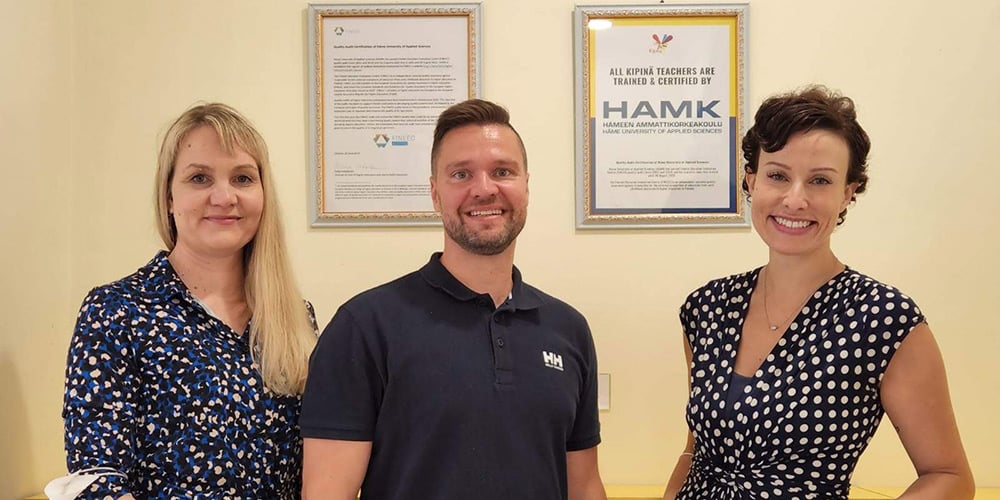Kipinä Kids grows globally – HAMK trains employees

HAMK has already trained around 70 early childhood education professionals for the multi-national company Kipinä Kids, which operates early childhood education centres around the world. The basic idea is to introduce a child-centred model that respects children’s rights.
Text by Jaana Siljamäki, photo by Kipinä Kids
Inspired by Finnish early childhood education, the multi-national company Kipinä Kids has franchised nurseries and pre-schools in 15 countries. Since 2018, HAMK has trained all the early childhood education teachers and leaders who work in Kipinä centers, for example, in Indonesia, Romania, Azerbaijan, Morocco and Egypt.
As this is a continuing programme, the content is adapted to the starting level of the participants. In other words, the participants have already a degree in the field, but Kipinä Kids wants its employees to acquire the skills corresponding to its philosophy through specific training, in order to ensure the quality of its operations.
“The curriculum and concept are Kipinä’s own, but through our programme, we aim to underline their child-centered perspective and the respect of the children’s rights, which we believe will enhance children’s well-being and learning. In some countries, this can be a revolutionary idea,” says Maaret Viskari, Director of HAMK Global.
The programme is conducted online and is available non-stop, as the Kipinä teachers are in different time zones. Typically lasting several months, the programme includes applied learning assignments, practical experimentations in nursery and a final project.
HAMK´s experts Samu Toivonen and Mari Korhonen are responsible for the basics of early childhood education, Irmeli Lignell for special needs education and Mervi Lepistö for the programme for the Kipinä centre directors.
Mari Korhonen and Samu Toivonen, lecturers at the HAMK’s School of Wellbeing, say that the teaching emphasises the importance of play, children’s individuality and agency and the importance of daily outdoor activities.
The teaching emphasises the importance of play, children’s individuality and agency and the importance of daily outdoor activities.
“In the target countries, the guiding idea in early childhood education might be about learning academic skills, with learning objectives and homework. We promote the idea that childhood is an intrinsic value and that different skills are taught in ways that are typical to the child: through play, exploration along with artistic experience and expression,” says Mari Korhonen.
The five-credit programme produced by Korhonen and Toivonen includes 15 different tasks and questions. The material includes videos demonstrating pedagogy in different situations in Nipsula centre for early childhood education at the Hämeenlinna university centre. In addition to implementing the programme, they assess the Kipinä teachers’ competence and the videos they produce and give their feedback on a separate final assignment.
“The tasks aren´t that easy. If we find gaps, we ask the Kipinä teachers to do it again. But it’s great to see how the participants’ competence grows along the way,” says Samu Toivonen.
Last autumn, Toivonen and Korhonen visited Jakarta, the capital of Indonesia, to hand out certificates to programme graduates at a graduation ceremony. Thirty media representatives were also present, and almost as many stories were produced for local newspapers.
“We don’t usually meet our participants, so this was a great experience for us too. The joy and enthusiasm among the people of Kipinä Kids was palpable.”
***
In the photo: Lecturers Mari Korhonen and Samu Toivonen, and Jeannine Laubner, Global Academic Director at Kipina Kids Nurseries.